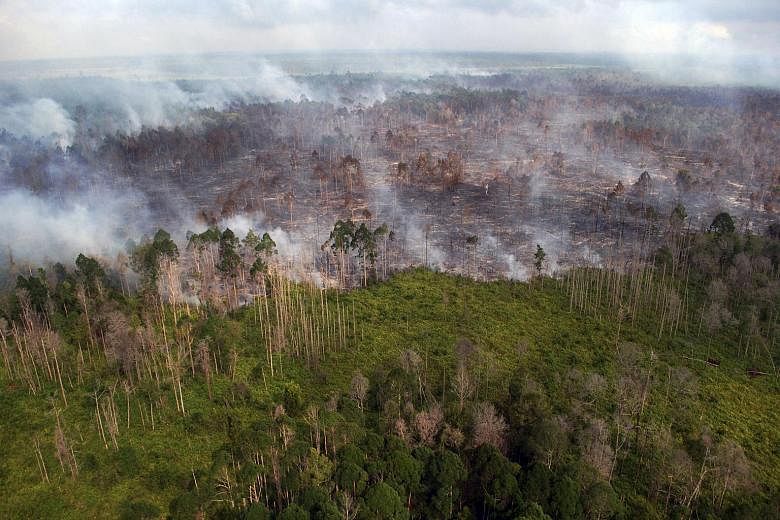Tensions between Indonesia and Singapore are simmering as a kerfuffle is developing over the decision by a Singaporean court to grant a warrant to the National Environment Agency (NEA) for an Indonesian businessman suspected of involvement in last year's forest fires.
The warrant was obtained after the businessman, whose identity has not been revealed, failed to turn up for an interview with the Singaporean authorities while he was in the city-state.
The saga took an interesting twist when Singapore's Ministry of Foreign Affairs denied its counterpart's repeated claims that a formal complaint against the warrant had been lodged by the Indonesian Embassy in Singapore.
The reason for Indonesia's umbrage remains unclear, although implicit in the protest was the notion that Singapore had tried to force Indonesia's hand in acting against responsible parties for last year's environmental disaster, which saw much of South-east Asia engulfed in a haze.
Jakarta's reaction suggests that it deemed Singapore to have overstepped its scope of action.
In contrast, the NEA felt that it had every right to prosecute those deemed responsible, based on the 2014 Transboundary Haze Pollution Act.
To be fair, Singapore's move was both logical and laudable. However, it was an inadvertent slap in the face for the Indonesian government.
Chiefly, politicians in Jakarta were worried that, if successfully pulled off, it was bound to be seen by the public as a derogation of sovereignty: that an Indonesian national could be arrested and even tried in a foreign country.
The swift action was also an embarrassing reminder of Jakarta's own unmistakable sluggishness in bringing the forest fire perpetrators to justice as a deterrent. Although the Indonesian police did arrest several company executives suspected of wrongdoing last year, no tangible progress has been made regarding their prosecution, so far.
A lack of transparency has also marred the process, with Jakarta seemingly intent on protecting the identities of the companies suspected of setting fire to the forests or being negligent in preventing forest fires in their respective concessions.
Singapore's Foreign Ministry has, understandably, described Indonesia's reaction as "puzzling".
To any outsider, this view probably holds sway too. Yet, the majority of Indonesians would really see Singapore's action as an insult.
The main problem here is that post-Suharto Indonesia is still grappling with how to deal and interact with the Singapore of today.
Most Indonesians probably admire the country for its efficient bureaucracy, cleanliness and overall orderliness - the opposite of how things are in Indonesia.
Our middle class still likes to shop in Singapore for luxury goods and, given the choice, most of them, when ill, would rather be treated in Singapore than at home.
Yet, for a resource-oriented nation like Indonesia, it is difficult to fully understand Singapore's economic success, especially as the island lacks natural resources.
The "resource" mentality is, after all, part of the national myth in Indonesia. Every student is taught from an early age how Indonesia's rich resources can make the country prosperous, and how this makes it the envy of the world and even the target for the colonial agenda in the past and, later, for neo-colonial exploitation.
It rarely occurs to us that today's advanced economies have gone beyond the exploitation of natural resources and the production of goods as their mainstay in the search for economic prosperity.
The green-eyed monster is now quite real in the way many Indonesians see Singapore.
Coupled with the firm belief that many of Indonesia's super-rich park their funds in the city-state, it has been conveniently cast as a "foreign" scapegoat for Indonesia's own failures, even among the educated classes. Singapore is also often portrayed as a pushy and cunning little neighbour who takes advantage of Indonesia's good and gullible nature.
However, many of the accusations against Singapore widely circulated in the Indonesian press could hardly pass the litmus test for accuracy. For example, the "revelation" by former air force chief Chappy Hakim that the airspace above Riau islands falls under Singapore's Flight Information Region (FIR), while factually true, neglects to mention that FIRs' overlapping national boundaries are more common than he would allow.
It is also conveniently forgotten that Indonesia manages the FIRs for both Timor Leste, a sovereign state in its own right, and Christmas Island, a territory belonging to Australia. The Indonesian press hardly highlights the fact that revenues derived from managing airspace above Riau are remitted monthly by Singapore to the Indonesian government.
Instead, the issues of national pride and "unjust" benefits for Singapore at Indonesia's expense are exaggerated ad nauseam.
It is high time that we cultivated a new mindset in dealing with Singapore. The Suharto-era, self-imposed view that Indonesia must necessarily act as South-east Asia's "big brother" is no longer relevant, given today's geopolitical realities. Former president B. J. Habibie's jibe at Singapore being a "little red dot" has also gone sour as Singaporeans have appropriated the insult as a badge of pride.
In many ways, the consoling myth of Indonesia as the "big brother" in South- east Asia has been a source of great complacency for us. Rather than chastising us into bettering ourselves, it has lulled us.
Isn't it time for us to wake up?
•Johannes Nugroho is a fiction and non-fiction writer, and small business owner from Surabaya. He is currently working on his first novel, which is set in 1998, the tumultuous year that former president Suharto stepped down. This article was first published on May 20 in the Jakarta Globe, http://jakartaglobe.beritasatu.com

